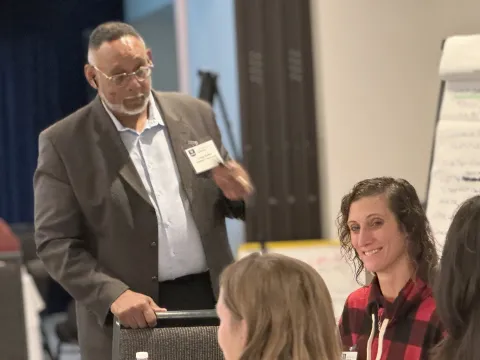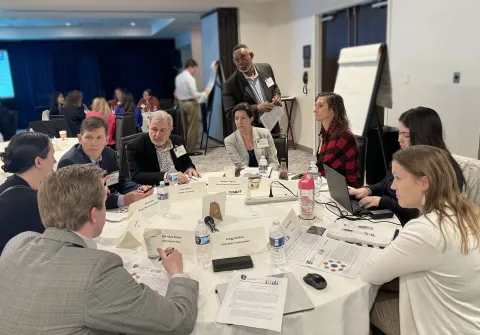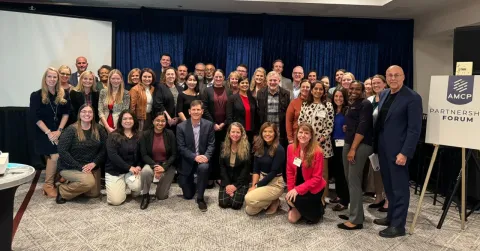
AMCP Partnership Forum: Fostering Collaboration Between Patients and Payers to Help Produce Better Health Outcomes

Across the health care ecosystem, people are working hard to find innovative ways to incorporate — and elevate — the patient voice in decision-making that will shape the delivery of health care for generations to come. At AMCP, we’re proud of the work we’ve begun to help identify where patient viewpoints and experience can help enhance our focus on improving access and affordability for millions of individuals across America.
A recent AMCP Partnership Forum drew participants from a range of backgrounds and perspectives to discuss the value of collaboration between health plans/payers and patient advocacy organizations in managed care pharmacy decision-making.
Partnership Forums are a valued venue at AMCP that have driven progress and shaped our advocacy in important ways in the recent past. In 2015, we established the Biologics & Biosimilars Collective Intelligence Consortium (BBCIC) following a Partnership Forum to help advance the cause of biosimilars and their benefits to patient health and the affordability of prescription medications. We also generated the concept of Pre-Approval Information Exchange (PIE), which resulted in the passage of the PIE Act — a tremendous policy victory for AMCP — last year that will help expedite the process for treatments to get to market and ultimately save countless lives.
With that context and precedent, we designed this new Partnership Forum to bring the patient perspective into managed care pharmacy in a sensible and powerful way. Our initial discussions validated the premise — and the promise — of what we are trying to achieve, and this blog gives some key takeaways from the engagement that will help fuel this effort moving forward.
Defining "Patient-Centered" and Working Toward a Standard
As with any emerging effort, different groups and companies will try different approaches to achieve desired results. The journey toward being more patient-centered can begin with defining what that entails — or doesn’t.
In its simplest form, this effort requires building communication, respect, and trust that will accrue results over time. For plans/payers, being patient-centered means helping patients play an active role and seeking methods and opportunities to optimize the use of the information they provide. It’s about doing things with — not for or to — patients.
From a patient perspective, it’s about delivering meaningful, authentic, active contributions that showcase their unique experiences, values, and expertise. It’s important for both parties to recognize that being patient-centered does not mean writing blank checks. It requires finding a balance in the relationship that can position patients as partners and advisors.
Research has been a driving force in helping elevate the role of patient advocacy and giving structure to plans/payers seeking to do more in this space. Whether through the growing use of data from the Institute for Clinical and Economic Review (ICER) or incorporating patient advisors on research teams, groups are finding ways to make this relationship more standardized, which can hopefully enable even more patient-centered collaboration.
Facilitating Direct Communication

Patient advocacy has come a long way recently, from what one participant described as the “Wild West” a decade ago. Even so, patient advocacy is still more reactive than proactive. But groups are working to change that. They’re identifying ambassadors and finding new voices to build perspective. This won’t happen overnight, and there are ways plans/payers in the public and private sectors can help facilitate a more open exchange of ideas and experiences.
Plans/payers can provide a roadmap for engagement to help encourage patients to be more proactive. For many would-be patient advocates, simply entering through a company's “front door” can be a challenge. Companies can help overcome this by sharing more details on how they operate. How do you make decisions? What committees meet — and when? Just like the patients they serve, each company is different, so sharing information in this vein will help individual patients and advocacy groups understand where they may be able to connect and add value.
And don’t overlook simple ways to invite perspective. Even a seemingly small detail like establishing a single email address that delivers inbound patient communications across the relevant team — and making that email visible and accessible on a website and elsewhere, will make a huge difference.
Establishing Information Symmetry
One of the most striking concepts that resonated throughout AMCP’s Partnership Forum was the importance of information symmetry or the lack thereof.
This is rooted in the experience and understanding that patients and plans/payers can, at times, be talking about the same thing but using a different language. Not language in the English/non-English definition of the term, but in the sense that certain words or phrases that mean one thing to a patient or payer could mean an entirely different thing — or hold no meaning at all — for the intended recipient. This means groups can be talking past each other, missing a chance to connect and learn.
Patients and plans/payers alike can help overcome this by stepping out of their normal communications mindset to put themselves in the shoes of the intended recipient of their message. What are we trying to say? Is there a simpler, more illustrative way to deliver that message or perspective? By striving toward information symmetry, we can help bridge an important gap to make connections and drive positive outcomes that might otherwise be missed.
Enhancing AMCP’s Role
It is impressive how intentional patient advocates and plans/payers have been in their work to elevate the patient voice in healthcare decision-making. People spoke proudly at the Partnership Forum about their successes and shared honestly about where they fell short but still had an opportunity to learn.

That is why AMCP is so proud of its role in convening people and perspectives from various backgrounds to share information and overcome challenges. We thrive on the exchange of information and connections that our members and stakeholders can make during events like our Partnership Forum. However, our work does not stop there. We are excited to take the new connections we’ve made and information we’ve learned from this event and determine where we can incorporate new opportunities to share best practices, lessons learned, and individual patient viewpoints into our daily work through conferences, communications, publications, and our advocacy with policymakers and regulators. We thank all those who participated in the Partnership Forum and welcome the opportunity to hear from new entities looking to join the conversation.

Jennifer L. Mathieu
Senior Vice President, Professional and Government Affairs, AMCP
Published on Dec. 15, 2023
Featured News & Resources
See Full CalendarAI Pre-Conference Program
AMCP Southwest Day of Education
Upcoming Events
AMCP offers a wide variety of educational opportunities, from events and webinars to online training.







